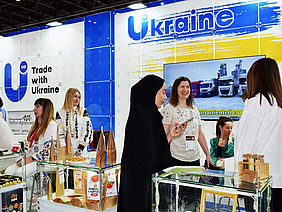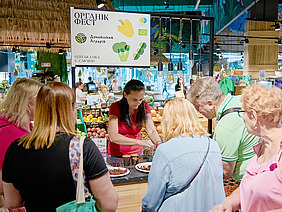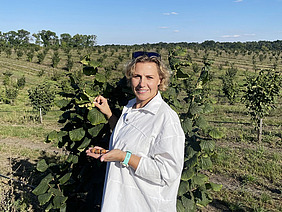For around twenty years now, FiBL has been supporting Ukrainian producers in converting to organic farming and marketing their products. During this time, the area dedicated to organic agriculture has almost tripled, increasing from 164,000 to 470,000 hectares − a feat made possible in no small part thanks to the support of a FiBL project. The project also contributed to 383 Ukrainian organic farms having been certified by the end of 2023. Ukraine has thus been able to establish itself as a reliable international trading partner for organic products, even during challenging periods.
Organic Farming Act – in the midst of war
Let's start with the good news: Ukraine has implemented its national organic legislation. This means it is now compatible with EU and Swiss legislation. This will make it easier for Ukraine to negotiate with the European Union. Further milestones in 2023 and 2024 included the introduction of a state register for organic certification bodies and farms, and a national logo for organically produced products. FiBL provided technical support for drafting the organic legislation and offered advice and assistance with the logo design competition.
Financial aid for greater resilience
As part of the SECO-funded project, FiBL was able to provide emergency loans totalling CHF 90,000 to around forty organic farms, half of which are run by women, at the end of 2024. The support is primarily aimed at improving product quality and packaging. This will help to improve the resilience and adaptability of organic farms. Furthermore, these measures promote healthy nutrition, even in times of war.
Fifth largest organic exporter despite the war
Despite the war, Ukraine was one of the five largest exporters of organic products to the EU in 2023, and it continues to produce and export at a high level. FiBL is currently strengthening its support for Ukrainian organic producers in the area of exports. This includes helping them to participate in international trade fairs such as Biofach in Nuremberg, Anuga in Cologne, Sial in Paris and Gulfood in Dubai. This gives Ukrainian organic farms the opportunity to showcase their products to an international audience, maintain contact with existing customers, and access new markets.
Labour shortage
One of the biggest challenges facing Ukrainian organic agriculture is the shortage of labour in production and processing caused by the war. Damaged infrastructure (power outages, damaged or interrupted transport routes, etc.) and soaring costs are also creating enormous difficulties.
Declining purchasing power and sales
Shortly before the start of the Russian war of aggression at the end of 2021, sales of organic products on the Ukrainian domestic market totalled around USD 33 million. Sales have fallen sharply due to the situation caused by the war. The main reasons for this are the migration-induced population decline and the sharp drop in the purchasing power of the Ukrainian general public, which was 85 per cent below the EU average in 2024.
The export volume of organic products decreased by almost a quarter between 2021 (261,000 tonnes) and 2023 (198,000 tonnes). In monetary terms, the decline was around 37 per cent, falling from 222 million US dollars in 2021 to 141 million US dollars in 2023. Whether Ukraine will maintain its position among the EU's five largest importers of organic products in 2025 remains to be seen.
Author: Tobias Eisenring.
This article was published in the current FiBL Activity Report.
Further information
Contact
Links
- fibl.org: Activity report 2023/2024
- qftp.org: Website "Quality Trade Food Program"
- fibl.org: Podcast "After three years of war: A FiBL mission to Ukraine"
- youtube.com: Video "Organic trade in times of war: Women at the forefront"
Funding of the Quality Trade Food Program
State Secretariat for Economic Affairs (SECO)






